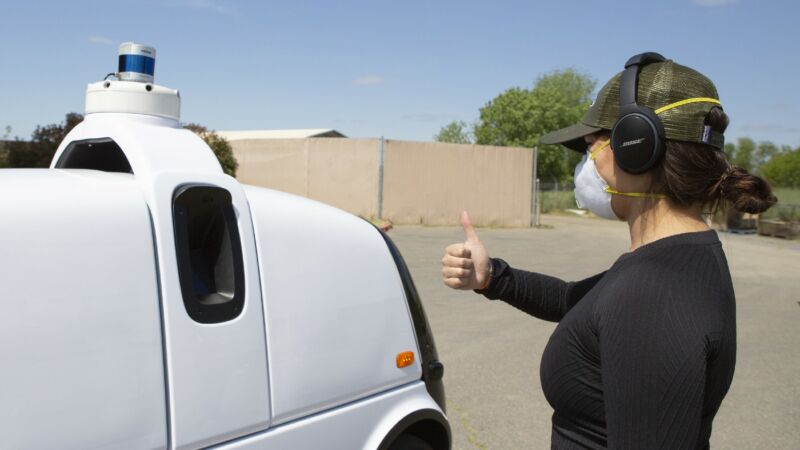
Nuro, one of the nation's best-funded self-driving vehicle startups, has begun using its robots to ferry food and medical supplies around a California stadium that has been converted into a coronavirus treatment facility, president Dave Ferguson announced on Wednesday.
"We realized that we could potentially use our R2 unmanned vehicles to provide truly contactless delivery of goods, where we remove any possible interaction between a driver dropping off goods and a person picking them up," Ferguson wrote. Contactless delivery could reduce the spread of COVID-19.
In a Tuesday phone interview, Nuro policy chief David Estrada told Ars that the robots are ferrying food, supplies, and medical equipment from the parking lot of Sleep Train Arena, former home of the Sacramento Kings, into the stadium itself. Human workers at designated locations load the vehicles at one end of a trip and unload them at the other. The vehicles open and close their cargo doors automatically based on hand signals from the workers so they don't have to touch the vehicle.
Nuro's robots are capable of traveling up to 25 miles per hour. But Estrada says that inside the stadium, Nuro will exercise an "extreme level of caution" and set a top speed of 5 miles per hour.
Nuro is also planning to provide robot deliveries at a makeshift medical facility located in the San Mateo County Event Center in California, Ferguson said.
Nuro delayed the rollout of robot deliveries in Houston
The new effort represents a significant shift of focus away from Nuro's core food delivery business. Nuro began testing robot grocery deliveries in Arizona in late 2018. Nuro used its first-generation robot, called the R1, to deliver groceries from Fry's Food, a Kroger subsidiary. From the beginning, Nuro has followed each robot with a chase car containing a human supervisor who could shut it down if it malfunctioned. Ferguson told me early last year that he hoped to stop using chase cars by mid-2019.
Since then, Nuro has shifted its delivery service from Tempe to Houston and developed a new robot, the R2. In February, the federal government gave Nuro some special exemptions to omit features—like rearview mirrors—that make no sense in a vehicle with zero occupants, clearing the way to use the vehicles on public roads.
Nuro had planned to start using the R2 in Houston around now. But at the last minute, the company put those plans on hold to focus on the medical supply project. Estrada told Ars that Nuro isn't doing any robot deliveries in Houston right now. Instead, the company is delivering groceries for Houston-area Kroger stores using its fleet of modified Priuses, with a safety driver behind the wheel of each car.
A Nuro spokeswoman told Ars by email that Nuro "aims to roll out the use of its R2 vehicles" with partners in Houston "in the coming weeks." In addition to Kroger, Nuro also has partnerships with Walmart and Domino's. "We will start operations with a chase car initially, with the intention to move to full autonomy shortly thereafter," the spokeswoman said.
Delivering medical supplies is obviously a worthwhile goal, but I wonder if Nuro's grocery delivery business might ultimately be more helpful in a post-coronavirus world. Nuro's robots are too big to operate inside conventional hospitals, so the potential market for Nuro's robots might be fairly small here. At least one of Nuro's rivals with smaller robots, Kiwibot, is also experimenting with delivering medical supplies.
By contrast, there's massive unmet demand for delivery of groceries and other essential items to people's homes, and contactless deliveries are a huge selling point there, too. Nuro's robots are bigger and faster than robots from other delivery startups, which could allow them to serve areas where the smaller robots aren't practical.
On the other hand, the size and speed of Nuro's robots also make it a bigger engineering challenge to operate them without human supervision, compared to sidewalk delivery robots. Companies like Kiwibot and Starship have had their robots operating without direct human supervision for more than a year now. Nuro says it will be able to do the same thing soon, but we'll have to see when that actually happens.
reader comments
19